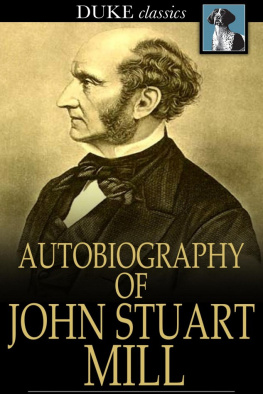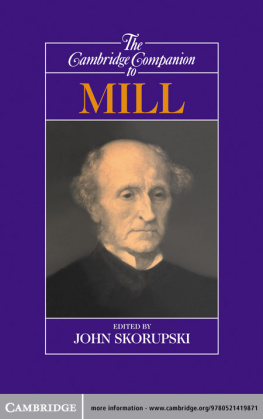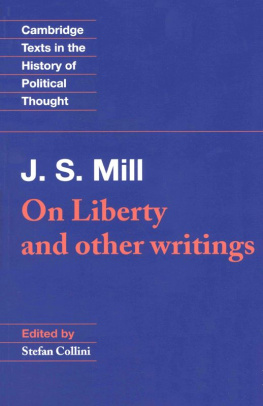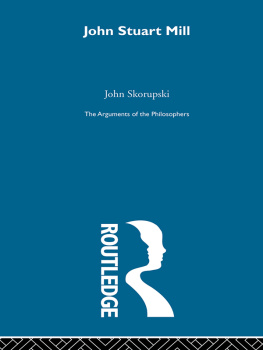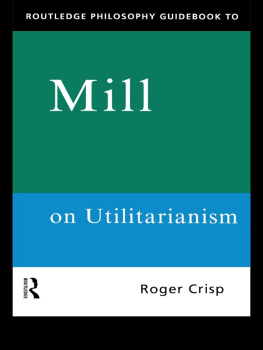Mill John Stuart - Utilitarianism
Here you can read online Mill John Stuart - Utilitarianism full text of the book (entire story) in english for free. Download pdf and epub, get meaning, cover and reviews about this ebook. genre: Science. Description of the work, (preface) as well as reviews are available. Best literature library LitArk.com created for fans of good reading and offers a wide selection of genres:
Romance novel
Science fiction
Adventure
Detective
Science
History
Home and family
Prose
Art
Politics
Computer
Non-fiction
Religion
Business
Children
Humor
Choose a favorite category and find really read worthwhile books. Enjoy immersion in the world of imagination, feel the emotions of the characters or learn something new for yourself, make an fascinating discovery.
- Book:Utilitarianism
- Author:
- Genre:
- Rating:5 / 5
- Favourites:Add to favourites
- Your mark:
- 100
- 1
- 2
- 3
- 4
- 5
Utilitarianism: summary, description and annotation
We offer to read an annotation, description, summary or preface (depends on what the author of the book "Utilitarianism" wrote himself). If you haven't found the necessary information about the book — write in the comments, we will try to find it.
Utilitarianism — read online for free the complete book (whole text) full work
Below is the text of the book, divided by pages. System saving the place of the last page read, allows you to conveniently read the book "Utilitarianism" online for free, without having to search again every time where you left off. Put a bookmark, and you can go to the page where you finished reading at any time.
Font size:
Interval:
Bookmark:
The Project Gutenberg EBook of Utilitarianism, by John Stuart Mill
This eBook is for the use of anyone anywhere at no cost and with
almost no restrictions whatsoever. You may copy it, give it away or
re-use it under the terms of the Project Gutenberg License included
with this eBook or online at www.gutenberg.net
Title: Utilitarianism
Author: John Stuart Mill
Release Date: February 22, 2004 [EBook #11224]
Language: English
*** START OF THIS PROJECT GUTENBERG EBOOK UTILITARIANISM ***
Produced by Julie Barkley, Garrett Alley and the Online Distributed
Proofreading Team.
REPRINTED FROM 'FRASER'S MAGAZINE'
SEVENTH EDITION
LONDON
LONGMANS, GREEN, AND CO.
1879
CONTENTS.
CHAPTER I. GENERAL REMARKS
CHAPTER II. WHAT UTILITARIANISM IS
CHAPTER III. OF THE ULTIMATE SANCTION OF THE PRINCIPLE OF UTILITY
CHAPTER IV. OF WHAT SORT OF PROOF THE PRINCIPLE OF UTILITY IS SUSCEPTIBLE
CHAPTER V. OF THE CONNEXION BETWEEN JUSTICE AND UTILITY
There are few circumstances among those which make up the present condition of human knowledge, more unlike what might have been expected, or more significant of the backward state in which speculation on the most important subjects still lingers, than the little progress which has been made in the decision of the controversy respecting the criterion of right and wrong. From the dawn of philosophy, the question concerning the summum bonum, or, what is the same thing, concerning the foundation of morality, has been accounted the main problem in speculative thought, has occupied the most gifted intellects, and divided them into sects and schools, carrying on a vigorous warfare against one another. And after more than two thousand years the same discussions continue, philosophers are still ranged under the same contending banners, and neither thinkers nor mankind at large seem nearer to being unanimous on the subject, than when the youth Socrates listened to the old Protagoras, and asserted (if Plato's dialogue be grounded on a real conversation) the theory of utilitarianism against the popular morality of the so-called sophist.
It is true that similar confusion and uncertainty, and in some cases similar discordance, exist respecting the first principles of all the sciences, not excepting that which is deemed the most certain of them, mathematics; without much impairing, generally indeed without impairing at all, the trustworthiness of the conclusions of those sciences. An apparent anomaly, the explanation of which is, that the detailed doctrines of a science are not usually deduced from, nor depend for their evidence upon, what are called its first principles. Were it not so, there would be no science more precarious, or whose conclusions were more insufficiently made out, than algebra; which derives none of its certainty from what are commonly taught to learners as its elements, since these, as laid down by some of its most eminent teachers, are as full of fictions as English law, and of mysteries as theology. The truths which are ultimately accepted as the first principles of a science, are really the last results of metaphysical analysis, practised on the elementary notions with which the science is conversant; and their relation to the science is not that of foundations to an edifice, but of roots to a tree, which may perform their office equally well though they be never dug down to and exposed to light. But though in science the particular truths precede the general theory, the contrary might be expected to be the case with a practical art, such as morals or legislation. All action is for the sake of some end, and rules of action, it seems natural to suppose, must take their whole character and colour from the end to which they are subservient. When we engage in a pursuit, a clear and precise conception of what we are pursuing would seem to be the first thing we need, instead of the last we are to look forward to. A test of right and wrong must be the means, one would think, of ascertaining what is right or wrong, and not a consequence of having already ascertained it.
The difficulty is not avoided by having recourse to the popular theory of a natural faculty, a sense or instinct, informing us of right and wrong. Forbesides that the existence of such a moral instinct is itself one of the matters in disputethose believers in it who have any pretensions to philosophy, have been obliged to abandon the idea that it discerns what is right or wrong in the particular case in hand, as our other senses discern the sight or sound actually present. Our moral faculty, according to all those of its interpreters who are entitled to the name of thinkers, supplies us only with the general principles of moral judgments; it is a branch of our reason, not of our sensitive faculty; and must be looked to for the abstract doctrines of morality, not for perception of it in the concrete. The intuitive, no less than what may be termed the inductive, school of ethics, insists on the necessity of general laws. They both agree that the morality of an individual action is not a question of direct perception, but of the application of a law to an individual case. They recognise also, to a great extent, the same moral laws; but differ as to their evidence, and the source from which they derive their authority. According to the one opinion, the principles of morals are evident priori, requiring nothing to command assent, except that the meaning of the terms be understood. According to the other doctrine, right and wrong, as well as truth and falsehood, are questions of observation and experience. But both hold equally that morality must be deduced from principles; and the intuitive school affirm as strongly as the inductive, that there is a science of morals. Yet they seldom attempt to make out a list of the priori principles which are to serve as the premises of the science; still more rarely do they make any effort to reduce those various principles to one first principle, or common ground of obligation. They either assume the ordinary precepts of morals as of priori authority, or they lay down as the common groundwork of those maxims, some generality much less obviously authoritative than the maxims themselves, and which has never succeeded in gaining popular acceptance. Yet to support their pretensions there ought either to be some one fundamental principle or law, at the root of all morality, or if there be several, there should be a determinate order of precedence among them; and the one principle, or the rule for deciding between the various principles when they conflict, ought to be self-evident.
To inquire how far the bad effects of this deficiency have been mitigated in practice, or to what extent the moral beliefs of mankind have been vitiated or made uncertain by the absence of any distinct recognition of an ultimate standard, would imply a complete survey and criticism of past and present ethical doctrine. It would, however, be easy to show that whatever steadiness or consistency these moral beliefs have attained, has been mainly due to the tacit influence of a standard not recognised. Although the non-existence of an acknowledged first principle has made ethics not so much a guide as a consecration of men's actual sentiments, still, as men's sentiments, both of favour and of aversion, are greatly influenced by what they suppose to be the effects of things upon their happiness, the principle of utility, or as Bentham latterly called it, the greatest happiness principle, has had a large share in forming the moral doctrines even of those who most scornfully reject its authority. Nor is there any school of thought which refuses to admit that the influence of actions on happiness is a most material and even predominant consideration in many of the details of morals, however unwilling to acknowledge it as the fundamental principle of morality, and the source of moral obligation. I might go much further, and say that to all those
Font size:
Interval:
Bookmark:
Similar books «Utilitarianism»
Look at similar books to Utilitarianism. We have selected literature similar in name and meaning in the hope of providing readers with more options to find new, interesting, not yet read works.
Discussion, reviews of the book Utilitarianism and just readers' own opinions. Leave your comments, write what you think about the work, its meaning or the main characters. Specify what exactly you liked and what you didn't like, and why you think so.







